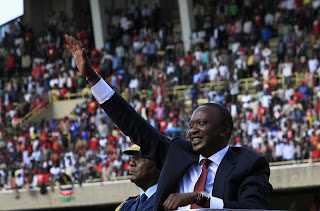EAC Budgets faced by Massive Donor withdrawal
With the gradual withdrawal by the foreign aid to East Africa, the EAC member states retreated to increasing revenue collections in order to face the constraint of the growing economy head on. The 4 east African member states Kenya, Uganda, Rwanda and Tanzania read their fiscal estimates which did not only underline their urge to attain their respective MDG goals that was crafted on economic sustainability.
Kenya’s Treasury secretary Henry Rotich presented a Kes1.645Trillion budget that analyst’s term as ambitious and dangerous to implement the historic budget that came along with the devolution. On the other part, Tanzania’s Finance minister William Mgimwa presented the Tshs18, 249 billions with the aim of fostering economic growth.
In Rwanda Finance Minister Claver Gatete presented a RWF1,653.5 billion fiscal estimates where the government shall raise 60.2% from local sources and external funding resting the remainder.
On the other hand the Ugandan budget was lean at Ush13, 169billion where the external sources shall form 20% of the total budgetary allocation funding.
Tanzanian government has said that it plans to raise Tsh18,249 billion from both domestic and foreign sources. Out of this amount, Tshs11,154.1 billion shillings are tax and non-tax revenue which is equivalent to 20.2 percent of the gross domestic product (GDP).
Tanzania which is the only country which recorded a high economic growth in the fading fiscal year said it expects to reduce the inflation to 6% as it projects to attain an economic growth of 7.2% up from the current 7%.
"The economy is projected to grow by 7 percent in 2013, and 7.2 percent in 2014 ... inflation is expected to fall to 6.0 percent in June 2014," Tanzania’s minister William said.
Tanzania farther plans to borrow up to Tsh2.86Trillion from both local and external sources to boost the revenue collection in order to fully finance the budget.
On growth Uganda’s economy is expected to accelerate its recovery to about 6 percent per annum in this coming fiscal year. According to the Finance Minister Maria Kiwanuka, This recovery is premised on maintaining macro-economic stability and improving resource mobilization.
Following the scandal at the Prime Minister Amama Mbabazi’s office the external aid has substantial been channeled directly to the projects which was awarded ush2,447 representing 91.99% of the total external aid from the donors.
Kiwanuka told Parliament at Kampala that the treasury shall get a budgetary support amounting Ush213 billion. However unlike Kenya seems to have lost the donor confidence who confirmed to grant the country Kes67.4bilion which represents a small amount of the total budget representing 4%.
Tanzania reaffirmed that their budget would be using 20.2% of the GDP and Kenya at 24% of the GDP the individual countries will have a significantly hard time to go to finance their projects which require huge budgetary allocation,
Uganda’s Kiwanuka told the parliament in Kampala that there is need to examine non-traditional sources of financing in light of declining budget support. In my own opinion, the massive donor withdrawal from the budgetary process is facilitated largely by the continued accusation of the west to have a hand in the judicial process ongoing at the ICC where one of the head of state and government is convicted.
The budgets of Tanzania and Uganda plans to reduce the rate of inflation by a double digit, Uganda registered an impressive decline from 18% to 3.6% and Tanzania projects an Inflation to average about 6 percent next financial year. The Uganda government sets the inflation to play around 5 percent over the medium term.
On Exchange rates Uganda, whose currency is the largest in the region reported minute stability of the currency that is a key determinant of economic competitiveness and has a major effect on the resource envelope, is expected to remain stable owing to the improvement in the trade balance.
Uganda hinted that in financial Year 2013/14, government will comprehensively review the exemptions in the VAT Act and the Income Tax Act with the aim of eliminating them to increase revenue and improve administration."
The move by the Uganda government to impose a call levy on the telecommunication network may cripple the globalization of the Ugandan nationals who may find it hard to cope up with.
Kiwanuka said "I propose to impose an International Calls Levy on international incoming calls and generate about 43 billion shillings."
Kiwanuka adopted the Kenyan mobile cash transfers and imposed an excise tax of 10 percent on fees charged on transfer of money by mobile network operators and other money transfer operators and widen the tax base, a move that is seen to have an effect on the cost of remitting money to and from one Mobile Money transfer to another.
In Rwanda, Finance minister Claver Gatete said “Current world developments including a weaker global economy and a prolonged crisis in the euro zone which could reduce our commodity export earnings, donor aid flows, migrant remittances and foreign direct investment flows will be expected to impact negatively on our domestic economic performance."
It would be remembered that the fading Fiscal year saw the EAC budgets deviate to local borrowing in caution of the Euro zone crisis. Rwanda projected to raise domestic revenues for the period at RWF 994.9 billion representing 60.2 percent of the total budget. External resources account for only 39.8 percent of the total budget or 658.6 billion francs.
With the huge deficits in the EAC budgets, the need to device ways of raising the required revenues still remains to be a major challenge to the EAC member states that have various blue prints of attaining major economic growth.


Comments
Post a Comment